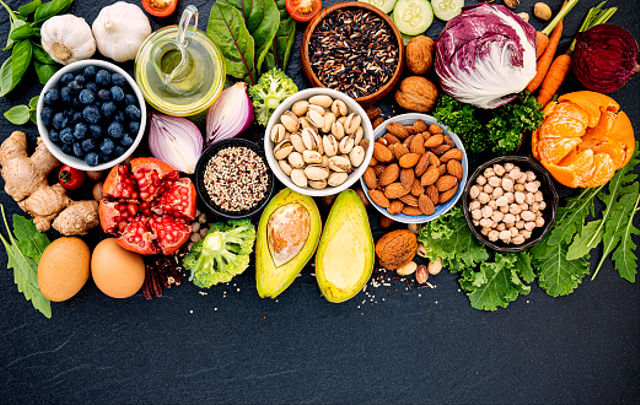A Peek at Indonesian Food During a Pandemic

World Food day – Photo by Pixabay
(Istimewa)During the pandemic where the coronavirus spreads around and threatens our health, we become more conscious about our health habit of washing our hands and surfaces, along with what we consume daily. The phrase “we are what we eat” rings true the past year where everyone is trying to increase the health of their bodies to fight the threat of the virus by choosing a healthier diet to increase their immune system.
For some people choosing a healthier lifestyle includes resisting the temptation to eat junk food and consuming more fruits and vegetables. For others less fortunate, choosing a healthy diet is challenging. According to the Food and Agriculture Organization of the United Nations, more than 3 billion people cannot afford a healthy diet. What this means is that almost 40% of the world’s population cannot afford or do not have access to nutritious and safe food.
This condition along with others is highlighted every year on October 16 as World Food day. It was established in 1945 to commemorate the founding of the Food and Agriculture Organizations of the United Nations and gradually became a way to raise awareness about hunger, malnutrition, sustainability, and food production. This year’s theme “Our actions are our future”, highlights the importance of a sustainable agri-food system for “Better production, better nutrition, a better environment and a better life” leaving no one behind. A system in which a variety of sufficient and safe foods is available at an affordable price to everyone, and nobody is hungry or suffers from any malnutrition.
Indonesia agricultural productivity
Over the past year, the pandemic disrupted the production and distribution of many industries. Resulting in a decrease in productivity or loss of profit. Despite the increased health risk for the community and agricultural sector workers, thereby threatening the activities/work and disrupting agricultural production, the agricultural sector is reported by Statistics Indonesia (BPS) as the highest contributor to the national economic growth in the second quarter of 2020. As reported by CNBC Indonesia, agricultural GDP grew 16,24% in the second quarter of 2020 (q to q), and on a year to year (y to y) basis, the agricultural sector continued to contribute positively, growing 2,19%.
All sub-sectors except for the livestock sub-sector contribute to the positive growth of the agricultural sector with the highest contributor coming from the food crops sub-sector with a 9,23% growth (y to y). The food crops sub-sector consists of rice, corn, soybeans, peanuts, green beans, cassava, and sweet potatoes, which are most needed during the pandemic to meet national food sufficiency. While the livestock sub-section experienced a contraction of -1,83% from a decrease in demand for livestock products such as meats, milk, and fur. This is caused by the social restriction policy that has impacted the closure of processing plants, hotels, and restaurants. The other noticeable growth is the 0,86% growth from the horticultural sub-sector. This growth is caused by the high demand for vegetables, fruits, and medicinal plants as immune booster commodities during the pandemic.
The positive growth of the agricultural sector despite the threat from the pandemic is reportedly due to the shift in planting season and the support given to the farmers by the government through the Ministry of Agriculture and other community groups.
Pupuk Kaltim’s Makmur Program helps increase Indonesian agricultural productivity
One company helping Indonesian farmers secure their agricultural productivity is PT Pupuk Kalimantan Timur (Pupuk Kaltim). As a subsidiary company from state-owned enterprise (BUMN) PT Pupuk Indonesia, Pupuk Kaltim initiated the Makmur Program as an agricultural solution to support national food security. It is done by increasing agricultural productivity and expanding the food crops area along with farmer welfare. This program, previously called Agrosolution, has been pioneered since the end of 2020 and implemented in several Pupuk Kaltim distribution areas of responsibility such as East Java, Kalimantan, and Sulawesi.
As reported from Republika.com, the President Director of Pupuk Kaltim Rahmat Pribadi said that the program is “Pupuk Kaltim’s efforts to use the domestic non-subsidized fertilizers, by creating an ecosystem to boost the productivity and welfare of Indonesian farmers”
The program tries to solve the three limitations that farmers have: market access, finance, and technology in order to increase agricultural capacity. It is realized through intensive and sustainable assistance involving supply chains that are supported by technology that is based on the sustainability triple bottom line: people, planet, and profit. With this program, farmers are not only facilitated with capital to obtain seeds, fertilizer, and pesticide, but also insurance to anticipate losses from crop failure.
Based on the results of the third quarter of 2021, the Pupuk Kaltim planting area for the Makmur Program reaches 13.796 hectares or 115% of the previously targeted 112.000 hectares. That planting area is divided into 2.452 hectares of rice commodities, 3.085 hectares of corn, 6.220 hectares of palm oil, and other commodities such as chili, shallots, garlic, cocoa, and sugarcane covering an area of 2.039 hectares. The program has shown significant results in various commodities especially rice and corn with productivity reaching 140%-145%. Its success can also be seen from the increase of rice productivity in Banyuwangi, Jawa Timur that increased from 5 tons per hectare to 9 tons per hectare. The significant increase in productivity also means an increase of income for the farmers by around Rp 24 million per hectare from the previous maximum of Rp 10 million per hectare.
Partnered with 6.557 farmers, the Makmur Program is one of Pupuk Kaltim’s steps to invite people to become food heroes and contribute to the transformation of a better agri-food system referring to the previously mentioned theme of the World Food Day “Our action our future”.
Mariah Safaanah
